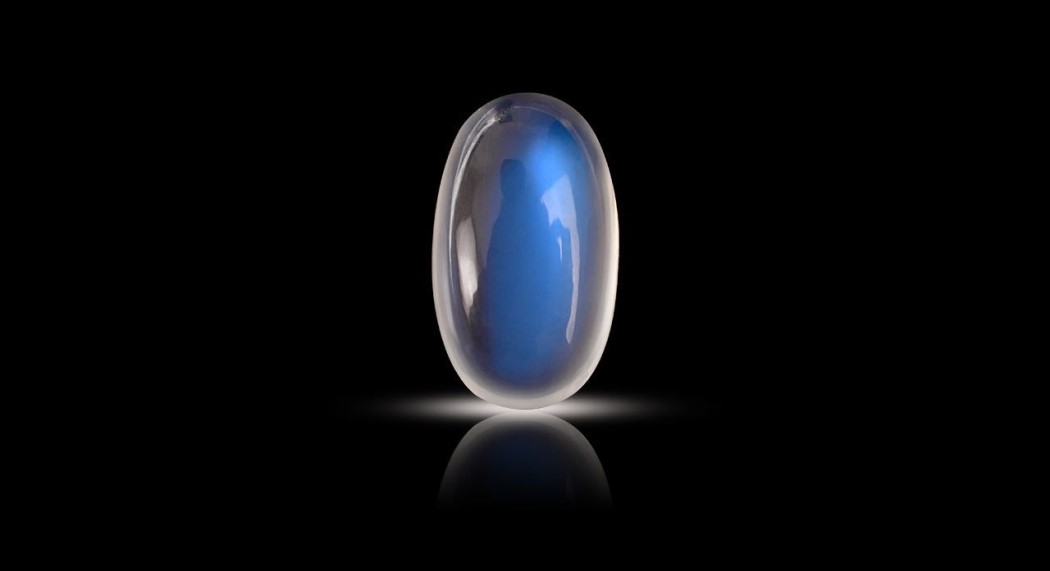Gem, Diamond and Jewellery

Ceylon Moonstone, or the Ceylon Opal, is a widely popular semi-precious stone known for its texture and colouration that resembles the moonlight shining through a bed of clouds. Considered to be the jeweller’s best friend, it is widely used in jewellery designing thanks to its lustre and mystic beauty that adds depth and dimension to any ensemble.
Sri Lanka is one of the major producers of moonstone and holds a dominant position in the global precious and semi-precious stone industry. Moonstones found on the island are widely sought- after due to their high quality. Characterized by an intense colouration that catches the eye instantly, they are exported to major markets all around the world including Switzerland, Germany, and Japan.
The raw moonstone or the moonstone rock is simply the mineral feldspar, a sodium aluminosilicate. Its mineral class is orthoclase and its chemical formula reads as (Na, Ca)Al₁₋₂Si₃₋₂O₈, KAlSi₃O₈ (1). Moonstones are generally placed alongside the amazon stone and the sunstone, two other feldspars with different colourations and compositions.
While the most popular moonstone is the blue moonstone, there are various other colour variations within the moonstone family. For example, in Sri Lanka, white moonstones, grey moonstones, green moonstones, pink moonstones, blue moonstones, orange moonstones, yellow moonstones and brown moonstones are found. Moonstones sporting hues of faint grey, green or brown are generally known as ‘muddy moonstones in the local industry (1).’
The most prominent characteristic of the moonstone comes from its colour and lustre. In some cultures, it is considered to be a ‘beam of solidified moonlight’ due to its enigmatic and intense colouration that is complemented by its opaque texture. Sometimes, moonstones are known to have transparent and translucent textures as well. No matter what texture of colouration they have, all moonstones hold their unique beauty that compares with no other.
While the cultural connotations attached to the moonstone link its lustre with the mystical elements of moon power, scientifically speaking, its lustre comes from the perthitic exsolution of lamellar albite-feldspars that occur in extremely fine microscopic size. “The perthitic exsolution of lamellar are (most) regularly ordered in a feldspar lattice and thus are visible in the so-called ‘schiller’- plane when observed from a special direction (1).” This effect is also known as adularescence, the discerning characteristic relating to moonstones that make them ideal for jewellery.
Moonstones are categorized into different quality compartments, mostly based on their texture and adularescence.
Moonstones with different qualities are found in various parts of Sri Lanka. The most widely sought-after quality comes in transparent moonstones (crystal quality) that occur with strong sky-blue to dark blue schiller colours. However, crystal quality moonstones sporting such colours are found very rarely. In general, moonstones found in Sri Lanka can be divided into three quality categories as blue moonstones, semi- blue moonstones, and white moonstones. The first category contains crystal blue moonstones, blue moonstones, and muddy blue moonstones while the second category includes top semi- blue, normal semi- blue, and muddy semi- blue moonstones. Crystal white, silvery-white, pearly white, normal white, and muddy white moonstones fall under the third category (1).
Sri Lanka is a major provider of moonstones where these semi-precious stones are found in alluvial streams(2). In general, the major source of moonstones in Sri Lanka is situated in Meetiyagoda. The Meetiyagoda mine is located near Ambalangoda in the south of Sri Lanka and moonstones are mined from a strongly kaolinized feldspar pegmatite here. The rotted pegmatite of Meetiyagoda was discovered during agricultural work in 1906 and the moonstones found in this mine have been dominating the local market ever since (1).
In addition, moonstones of various qualities have been found in the central hill area of the country. Moonstones found from areas like Matale can be cut into bigger stones than those from the Meetiyagoda mine (1). In the past, moonstones have occurred in gravels in recent rivers as well as recent rivers like the Mahaweli Ganga and the Walawe Ganga. Also, moonstones have been found from worked gem gravel; Illam from Elipitiya, Pitigala, Horton Plains and Weligama are examples.
Apart from Sri Lanka, moonstones are also found in India, Madagascar, Brazil, Myanmar, and Australia (2).
Historically, moonstones are known as the stone of emotions. It is closely linked with mental clarity and emotional equilibrium. Many cultures believe that wearing moonstones on one’s person helps the wearer to be more focused, mentally strong and to cultivate a clearer vision. It is also believed to bring balance into men’s life by providing strong female (yin) energy, thereby balancing the two facets. In Vedic astrology, the moonstone is ruled by the moon. As the moon governs basic habits, emotions, personal needs and behavioural patterns of an individual, moonstones are supposed to have a close personal link with the wearer and to regulate his/ her mental and emotional state. Also, certain cultures believe that moonstones have healing properties and that they can shield wearers from emotional turmoil.
Moonstones have been always popular in the jewellery industry due to their mesmerizing beauty and the high demand that stems from their various uses and benefits. They can be seamlessly incorporated into jewellery sporting both modern and vintage designs. Currently, moonstone rings, necklaces, bracelets, earrings, pendants, and anklets are highly popular.
Ceylon moonstones are positioned among the highest quality moonstones found from all around the world. Distinguished by its enchanting beauty, it has enthralled the world. Today, incorporated into chic jewellery, Ceylon moonstones are popular with both men and women alike.